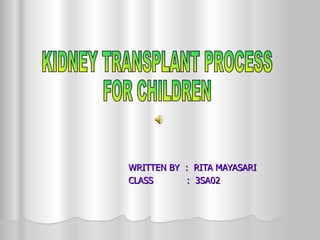
Kidney transplant process for children
- 1. WRITTEN BY : RITA MAYASARI CLASS : 3SA02 KIDNEY TRANSPLANT PROCESS FOR CHILDREN
- 2. The children who want to kidney transplant
- 6. While a child waits for a cadaver kidney transplant, it is important to remain in close contact with the transplant team. Because the transplant team may need to reach a candidate's family at any time of the day or night, we will ask for home and work phone numbers. Once a cadaver kidney becomes available, the child must come to Rochester as quickly as possible, usually within eight hours of notification. Keeping in touch
- 7. If a child becomes ill If the child becomes ill while waiting for transplant surgery, notify the pediatric nephrology transplant coordinator or the pediatric nephrologist immediately. Depending on the severity of the illness, transplant surgery may need to be postponed until the child is healthy enough to tolerate surgery.
- 8. Transplantation Living Donor vs. Cadaver Kidney Transplants In a living-donor transplant , an adult (18 or older) gives one kidney to the child. The donor can be either a family member or someone unrelated, such as an adult family friend. Living donors can continue to lead a healthy and normal life with their one remaining healthy kidney. In a cadaver transplant , the child receives a kidney from a healthy person who has died suddenly. In this situation, the deceased person's family has agreed to donate the kidneys for transplantation. The physician caring for the deceased person and a transplant surgeon will determine whether the kidney is suitable for the transplant recipient. It is not possible to predict when a cadaver donor kidney will become available.
- 9. Additional testing before surgery Transplant candidates should arrive a day or two before transplantation to undergo a physical examination by the pediatric nephrologist and some additional medical tests, including blood work, chest X-ray, urine test and an EKG. For a scheduled living donor transplant, the child is usually admitted to the hospital the evening before surgery.
- 10. What to bring to the hospital At the time of transplantation, bring any medical equipment that your child uses, such as a blood pressure cuff/machine, any dialysis equipment and enough dialysis solution for one week. Also pack an assortment of comfortable, loose-fitting clothes for your child to wear after surgery, as well as slippers for use in the hospital. Favorite toys, stuffed animals, games, mylar balloons, and videos are always welcome. It is very helpful to have a few other family members present to support and comfort to both the child and the donor.
- 11. Transplant Operation Kidney transplantation involves surgically placing another person's kidney (the donor) into a child's lower abdomen, usually on the lower right side. The transplanted kidney is placed in the pelvic area, not where the original kidneys are. Surgeons usually attach the donor ureter (the tube through which urine flows) to the child's bladder, allowing urine from the new kidney to flow in the normal manner. The child's own kidneys are usually not removed. The transplant surgery typically takes about three hours. The donor kidney should begin to function immediately.
- 12. Following Surgery Following transplant surgery, most children remain in the hospital for about one week. While hospitalized, the child will have a central line catheter in place for blood work and administering certain medications. A urinary catheter will also be in place for about five days. Daily blood tests will also be required. During recovery, as the discomfort around the incision lessens, the child can move around more and gradually return normal activities. In most cases, the child can get out of bed and take short walks the day after surgery. Nurses will assist the child with daily walking and deep breathing exercises, which are an important part of the recovery period. Different members of the transplant team will also help the child and family members learn more details about the medications needed to prevent the transplanted kidney from rejection.
- 14. Care at home When the child leaves Rochester, family should have instructions how to care him/her at home. The physicians have a report of the child's transplant status and home-going instructions concerning the frequency of blood work, which is usually three times a week after the child leaves Rochester.
- 15. Resuming physical activities Some children require a transition period to get back into full days of school, depending how fatigued they may feel. And children should resume participation in physical education classes gradually. But over time, most children should be able to participate in school, play sports, and feel energetic.
- 16. Medications The doctors expect all transplant recipients to need life-long treatment with immunosuppressant medicines to prevent rejection of the transplanted kidney. These medications must be taken daily following surgery. Kidney transplant team will choose these medicines based on the child's personal medical history and their extensive experience in preventing and controlling transplant rejection. Some children do experience side effects from their medications, but we have excellent success in finding an acceptable treatment plan in most cases.